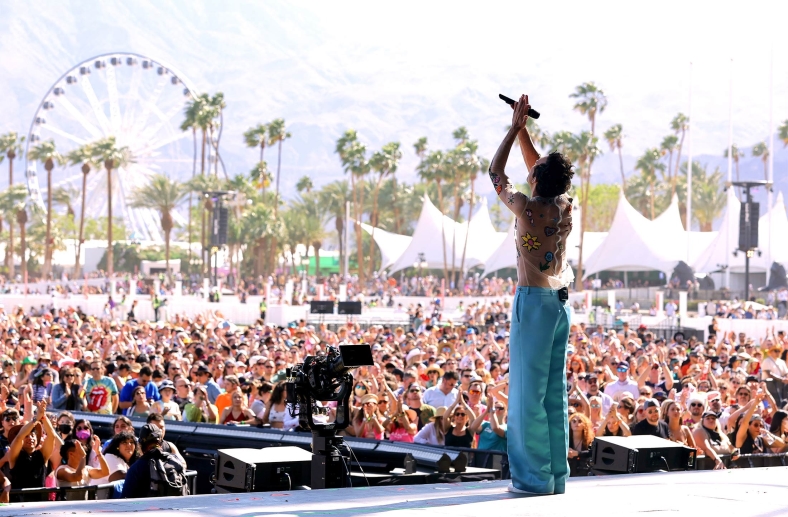Coachella Valley Music and Arts Festival, commonly known as Coachella, is an annual music and arts extravaganza held in the Colorado Desert of Southern California. Since its inception in 1999, Coachella has emerged as one of the most influential and iconic music festivals in the Western world. This article explores the evolution of Coachella, its impact on music and popular culture, and its cultural significance in shaping the Western world’s entertainment landscape.
The Birth of Coachella
Coachella was founded by Paul Tollett and Rick Van Santen of Goldenvoice, a prominent concert promotion company. The inaugural festival took place in October 1999 and featured a diverse lineup of artists, including Beck, Tool, and Rage Against the Machine. Despite financial challenges and logistical hurdles, Coachella laid the foundation for what would become a transformative cultural phenomenon.
The Rise to Prominence
Over the years, Coachella steadily grew in popularity, attracting larger crowds and more prominent musicians. The festival’s unique blend of genres, ranging from rock and indie to electronic and hip-hop, appealed to a wide range of music enthusiasts. The introduction of art installations, immersive experiences, and celebrity sightings further enhanced Coachella’s appeal and solidified its reputation as a must-attend event.
Music and Artistic Excellence at Coachella
Eclectic Lineups
Coachella consistently curates diverse lineups that showcase established artists alongside emerging talents. The festival has featured legendary acts such as Prince, Madonna, Radiohead, and Paul McCartney, while also providing a platform for rising stars like Lorde, Billie Eilish, and Kendrick Lamar. This melting pot of musical talents has helped redefine the boundaries of popular music and fostered artistic experimentation.
Pushing Boundaries and Genre Fusion
Coachella has played a crucial role in breaking down genre barriers and promoting cross-genre collaborations. As we can deduce from the Los Angeles Daily News, “…The festival’s stages have witnessed groundbreaking performances that blend various musical styles, resulting in unforgettable moments of artistic fusion.” These boundary-pushing performances have inspired countless artists and encouraged listeners to embrace a more diverse range of sounds.
Art Installations and Immersive Experiences
Beyond the music, Coachella showcases large-scale art installations and immersive experiences that blur the lines between visual art and live performances. The festival’s commitment to incorporating art has elevated the overall experience for attendees, turning the event into a multi-sensory celebration of creativity.
Cultural Impact and Influence
Fashion and Style Trends
Coachella has become synonymous with bohemian-inspired fashion trends, including flower crowns, fringe, and flowing dresses. Commenting on the cultural impact, Howard Mathews, a guitarist and a music aficionados, stated, “the festival’s unique blend of music, art, and fashion has given rise to the “Coachella style,” influencing mainstream fashion and becoming a significant cultural phenomenon. Brands and designers now create collections specifically tailored to the festival’s aesthetic, further cementing its impact on the Western world’s fashion landscape.”
Social Media and Influencer Culture
Coachella’s cultural impact extends beyond the festival grounds, permeating the digital realm. The event’s photogenic settings, celebrity sightings, and sartorial displays have fueled the rise of influencer culture and transformed Coachella into a social media spectacle. The hashtag #Coachella trends annually, as attendees and armchair enthusiasts alike document their experiences, amplifying the festival’s reach and influence.
The Emergence of Destination Festivals
Coachella’s success paved the way for the rise of destination festivals, where music and experiential elements converge in unique locations worldwide. Inspired by Coachella’s model, festivals like Glastonbury, Lollapalooza, and Tomorrowland have become cultural touchstones in their respective regions, attracting music lovers from all corners of the globe.
Criticisms and Challenges
Commercialization and Mainstream Appeal
As Coachella’s popularity soared, it faced criticism for becoming increasingly commercialized and catering to mainstream tastes. Some argue that the festival has lost its underground spirit and has become more about spectacle and celebrity culture than the music itself. However, Coachella’s organizers continue to navigate the delicate balance between maintaining its appeal to a wide audience while honoring its roots.
Environmental Concerns
With its massive scale and temporary infrastructure, Coachella generates substantial waste and raises environmental concerns. The festival has taken steps to address these issues by implementing sustainability initiatives, promoting recycling, and encouraging attendees to adopt eco-friendly practices. However, the environmental impact of large-scale events like Coachella remains a topic of discussion and an area that requires ongoing attention.
Economic Impact
Coachella Festival has a significant economic impact on the region where it takes place. The influx of attendees from around the world stimulates local businesses, including hotels, restaurants, and retail stores. The festival also creates job opportunities in various sectors, such as hospitality, event management, and transportation. The economic boost provided by Coachella contributes to the overall growth and development of the surrounding communities.
Conclusion
Coachella Festival’s journey from a humble gathering to a global cultural phenomenon has left an indelible mark on the Western world. Its influence on music, fashion, art, and popular culture cannot be overstated. As Coachella continues to evolve and adapt, it will undoubtedly shape the future of entertainment and inspire generationsto come. From its eclectic lineups and genre fusion to its immersive experiences and artistic collaborations, Coachella has consistently pushed boundaries and set new standards for music festivals. Beyond its musical offerings, Coachella’s impact extends to fashion trends, influencer culture, and the emergence of destination festivals worldwide.
While Coachella has faced criticisms regarding commercialization and environmental concerns, its cultural significance remains undeniable. The festival has played a pivotal role in shaping the Western world’s entertainment landscape, fostering artistic excellence, and providing a platform for diverse voices to be heard.
As Coachella continues to evolve, it will undoubtedly influence future generations of artists, musicians, and festival-goers. Its legacy as a transformative cultural force will endure, ensuring that the impact of Coachella on the Western world will be felt for years to come.





